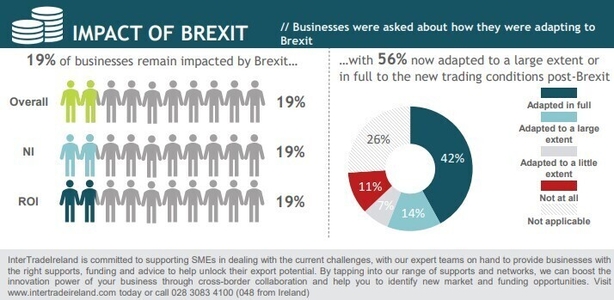The latest all-island business monitor from Intertrade Ireland reveals that the majority of businesses in Ireland say they are stable or growing and despite high inflation, businesses finished the year on a more positive note than expected.
InterTradeIreland's All-island Business Monitor for the fourth quarter of 2022 shows that nine out of ten businesses surveyed say they are in stable or growth mode.
It noted that this picture is remarkably similar in both Ireland (91%) and Northern Ireland (90%).
Businesses in both jurisdictions with export sales are experiencing the highest rate of expansion, with half enjoying growth.
Today's report shows that cross-border traders continue to have higher profit margins than their non-exporting peers.
A third of businesses that trade cross-border on the island says gains fall in the higher profit brackets of 10% and over, compared to just over a quarter of non-exporters.
But the report also found that 19% of firms remain impacted by Brexit.
56% said they had now largely or fully adapted to post-Brexit trading conditions, but 11% said they had not adapted at all.

71% of businesses in Ireland also said they have passed on price increases to customers due to rising costs.
Martin Robinson, InterTradeIreland's Director of Strategy, said that across all sectors, there is a real sense of businesses just putting their head down and getting on with it.
"It's important to note that despite the cost challenges most are still profitable. Manufacturing is more upbeat after recent price shocks - there could be a sense that most of the bad news is already priced in," Mr Robinson said.
"We would expect the hospitality sector to have a seasonal boost in the last quarter of the year; although fewer businesses in this sector are in growth mode relative to other sectors," he added.
Today's survey also shows that high input costs of both energy (87%) and other overheads (75%) remain the dominant issues for Irish business, with 71% reporting they have now passed on price increases to customers.
"Difficulty accessing skills remains an issue for one in five, while 82% of firms say they have largely adapted or remain unaffected by trading conditions post-Brexit," Mr Robinson added.

